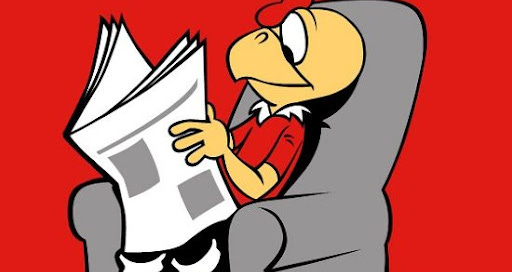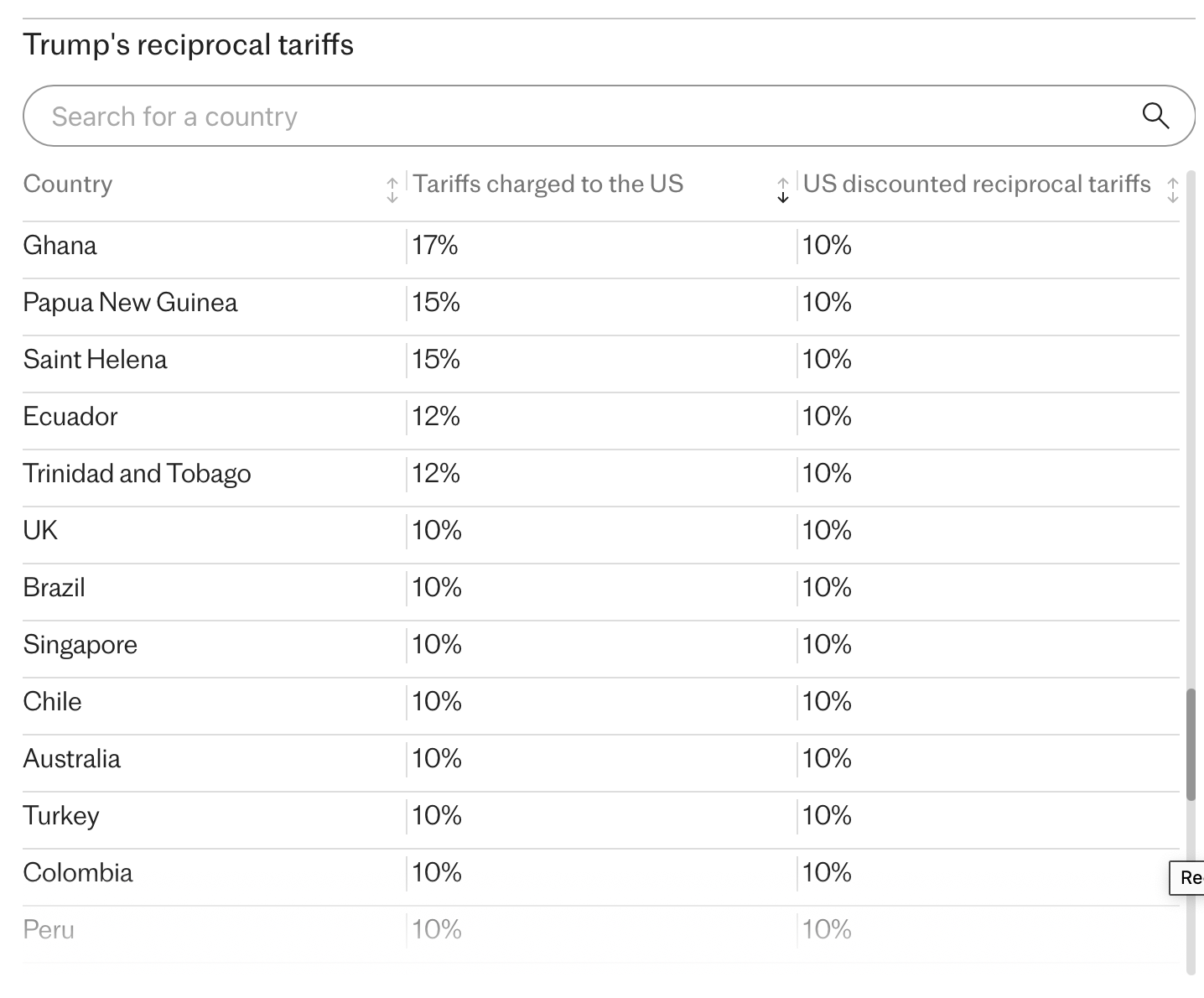Disclosure: I never had a moment’s hesitation when I voted for Brexit.
Brexit was a great opportunity for Britain to immediately start signing new Trade Deals with the rest of the World. Yet the only ‘new’ ones were with Australasia and Japan. I believe British governments of all stripes have been happy to chlorinate all supermarket salads. Yet they refused a trade agreement concession to the USA on the grounds of the USA’s chlorinated chicken. American chlorine was just not fair game.
The tables below show clearly that TODAY’S new tariffs are only quite mildly reciprocal. Yet there is widespread shock.
As far as I can see The Telegraph is the first major outlet to display the table fairly.
You can play and toggle with the table within the following insightful article.
Trump just proved Brexit was the best decision Britain ever made.
Britain will escape the punishing levies the US is imposing on imports from the EU. Europe’s manufacturers may even decide to move to the UK..
by Matthew Lynn, 02 April 2025
We have not seen much in the way of deregulation. Nor have we signed many blockbuster trade deals. And yet for anyone who is still wondering what the benefits were of Brexit, we now have a decisive answer. It has allowed the UK to escape the worst of Donald Trump’s tariff wars — and in the medium term that could pay extraordinary dividends.
As he unveiled his global tariffs at the White House, the UK was mercifully low down on the list. It wasn’t quite the “nul points” we often get at Eurovision, but our exporters will only face a 10 per cent levy on everything they sell into the US. It was less than much of the rest of the world. And perhaps most importantly, it was only half the 20 per cent imposed on the EU.
Sure, that will still hurt. The United States is our single biggest export market, and the levies will depress demand. Even so, there is no question that we have been let off relatively lightly.
And we can thank Brexit for that — for three reasons. First, if we were still part of the bloc, or even the Customs Union as hardcore Remainers would like us to be, we would be facing an immediate 20 per cent tariff rate, twice as high as we now will.
Next, the EU will almost certainly start a pointless tit for tat tariff war. It will impose retaliatory tariffs, prompting another round of higher levies from the White House, until tariffs hit 40 or 50 per cent on both sides. Inside the EU, we would have no choice but to go along with that. Instead Sir Keir Starmer and his Chancellor Rachel Reeves should be able to see that there is no point in trying to humiliate Trump or force him to back down. It won’t work. Our tariffs will stay at 10 per cent and we may even be able to negotiate them even lower or eliminate them completely, something the EU will find impossible.
Finally, it will mean British industry now has a clear competitive advantage over the rest of Europe. For Americans, a Scotch will be cheaper than Cognac, and Burberry cheaper than Hermes, but still with a luxury feel. Even better, there will now be a powerful incentive for EU manufacturers to ramp up production in the UK when they are selling products into the US. They will face lower tariffs while still manufacturing in Europe. A few may even move completely.
Of course, the tariffs will still damage the global economy. In effect, they are a huge tax increase, and one that will be paid by American consumers. They will leave the international economy in far worse shape than it was. Even so, the UK has clearly escaped relatively lightly. We might even be better off. And we have our departure from the EU to thank for that.
[END]
Meanwhile, our Social Science Files subscriber Professor Robert Tombs has a very interesting historical article in today’s The Telegraph.. [below]
Free trade is our national inheritance, but we cannot afford to remain naive
Unlike our dogmatic Victorian forebears, we must take every chance to bargain and negotiate..
by Robert Tombs, 02 April 2025
Britain has probably been the only country in history to regard import tariffs as a moral issue. For Victorians, “free trade” was like the Green movement today. Religious groups, women’s associations, peace campaigners and liberals generally supported free trade as a moral obligation, regardless of economic and social consequences.
They were convinced it would bring peace and freedom, while tariffs were the bedrock of oppression. As a tract for children put it, “everybody may be joined together in love and trade, like one great family; so that we may have no more wicked, terrible battles”.
On the other hand, some people stood to make a lot of money: exporters who wanted unrestricted markets and employers who wanted to keep wages down. The alliance of moralism and profit had some squalid consequences. Sir John Bowring, a leading free-trade crusader appointed governor of Hong Kong, encouraged war with China to force its government to permit the opium trade – both a step towards open-market utopia and also a gift to amoral merchants.
Few other countries bought into this utopian vision. That was Britain’s problem: practising free trade in a protectionist world. The Treasury refused to introduce tariffs, even as a bargaining tool.
America, Germany and (after a brief and unpopular free-trade experiment) France kept tariffs to protect domestic industry and agriculture for political and strategic reasons. By 1902, America was imposing 73 per cent tariffs on British imports, France 34 per cent, and Germany 24 per cent. They were fostering new industries when Britain remained tied to old staples such as cotton.
British agriculture, though efficient, declined further and faster than in neighbouring countries. Even when Britain was a leader in industry and finance, its move to free trade arguably made it somewhat poorer, though it certainly benefited countries exporting to Britain, including parts of the Empire – which nevertheless adopted tariffs against British exports.
When Joseph Chamberlain persuaded the Conservatives to advocate limited tariffs on non-Empire products, it caused electoral collapse. It was only in the 1930s, faced with disastrous industrial decline, rising protectionism and economic depression, that Britain adopted a system of “imperial preference”.
We are of course a long way from Victorian free-trade utopianism. Our position today is unfortunately more like the 1930s than the 1850s. Yet we still carry the imprint of Victorian orthodoxy. More than other countries, the British instinctively regard free trade as good and tariffs as bad.
Only a panic about post-imperial decline pushed us into the protectionist Common Market in the 1970s, which raised British food prices. The Common Agricultural Policy (with its “butter mountain”) was a particular British bugbear. Successive governments pressed for freer trade, while for many Europeans this obsession seemed irrational and destructive: why join an organisation and then try to dismantle it? Our dislike of protectionism, over-regulation and waste fuelled Euroscepticism and, finally, Brexit.
Our continuing divisions since 2016 have kept us in a strange no man’s land, neither a free-trading “Singapore on Thames”, nor a protected province of the gently declining EU. Whatever lip service we pay to freer trade, our official class- and self-interested industrial and farming lobbies will not wean themselves away from the European consensus.
Although outside the EU – except, of course, for Northern Ireland, that cleverly designed halter attaching us to Brussels – Britain is retaining much of its knee-jerk protectionism. This is so even when there is no possible advantage. For example, we still have EU legacy tariffs on tropical produce we cannot create ourselves.
We maintain strict quotas on free-range food from Australia and New Zealand, even if their production is at different times of year from ours. We believe scare stories about “chlorinated chicken” but happily consume chlorinated salad. We agree without qualms to unlimited imports of factory-farmed meat from Ireland, Denmark and Poland. We deplore the growth of food banks, yet refuse to buy cheaply from outside Europe while importing expensively from the EU.
In short, having long abandoned Victorian free-trade dogma and painfully extricated ourselves from EU protectionism, we are in a state of political and mental confusion. This matters because we now risk being drawn into a trade war that is essentially between Washington and Brussels. Both are protectionist, and have been for most of their histories. America has used many ways of protecting its industries. But at the moment, the EU, and especially Germany, have built up a large trade surplus with the US. This is due, in part, to Germany’s enviable tradition of manufacturing quality. But it is able to run such a huge and perpetual trade surplus due to a relatively cheap euro.
The EU as a whole has damaged many of its trading partners with tariff and non-tariff barriers. These mean, for example, that developing countries export primary products to the EU, which then gains the main profit from processing them. Hence, we import much of our tea not from Kenya but from Poland. However repugnant his methods, President Trump and others have a case against high tariffs on cars and food, and against over-restrictive regulations.
The idea that we should respond to Trump’s policy by re-engaging with the EU is illusory. We often hear complaints that makers of artisan cheese or micro-brewed beer can no longer export to the EU. That is unfortunate. But our visible exports that count – and the US is our largest national customer – are aircraft parts (worth more than £2 billion), luxury cars and, until net zero intervened, oil products, pharmaceuticals and chemicals. It is important to get exemptions for our struggling major exports, and in return we should accept more American agricultural products – including salmonella-free chicken.
Unlike the Victorians, we should not be dogmatic about free trade, but bargain and bargain hard. It is no consolation that whatever harm Mr Trump may do to our exports, by rushing to net zero we are already doing far more damage ourselves.
[END]










